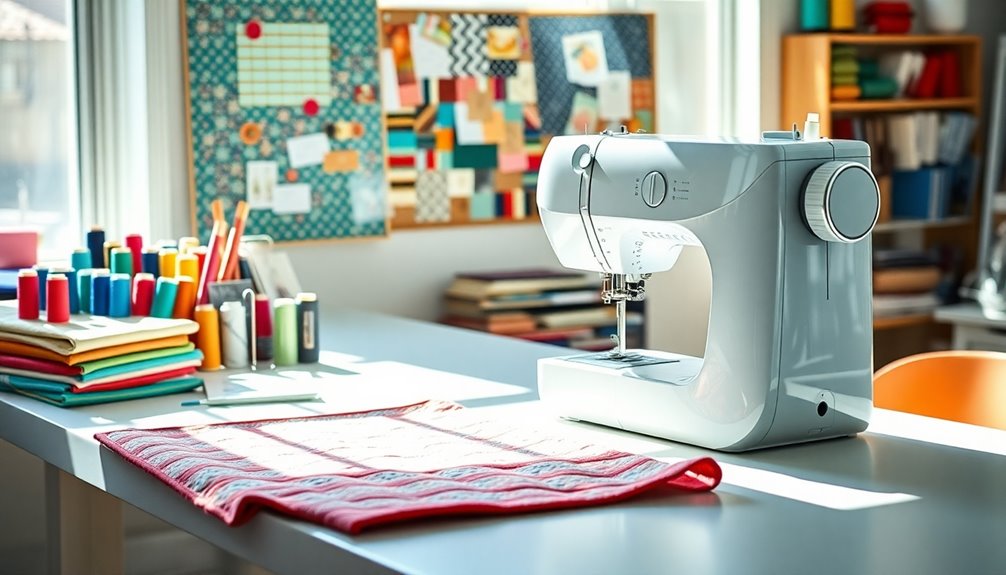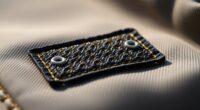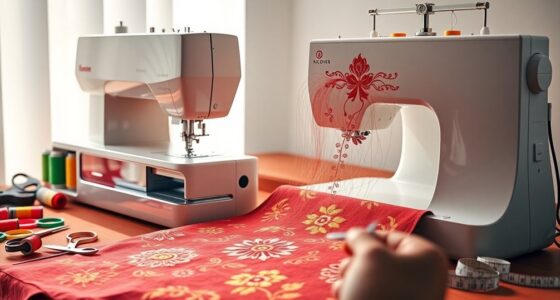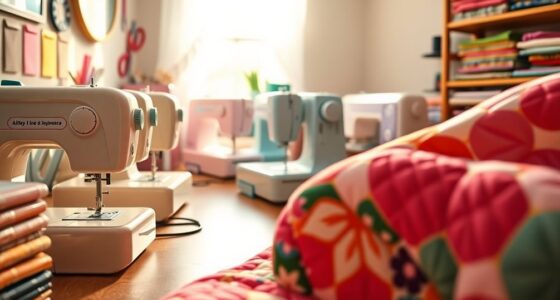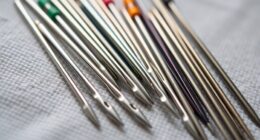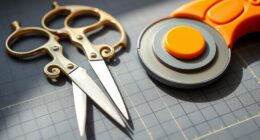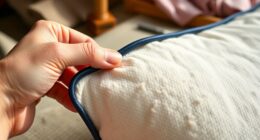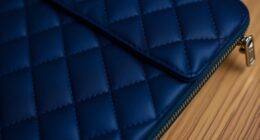I’ve discovered the 15 best sewing machines that can truly elevate your DIY projects. From the versatile SINGER Quantum Stylist 9960 to lightweight handheld options perfect for quick fixes, there’s something for everyone. Whether you’re a beginner or a seasoned crafter, these machines are designed with user-friendly features and impressive stitch options. Plus, they handle various fabrics with ease. Ready to plunge into the world of sewing? Let’s explore more details together! These top-rated models not only provide reliability and durability but also come equipped with advanced technology to make your sewing experience enjoyable. If you’re looking to tackle everything from simple alterations to more intricate creations, you’ll find that these are the best sewing machines for home projects. With their smooth operation and customizable settings, you can easily express your creativity and achieve professional results right at home.
Key Takeaways
- Choose machines with a variety of stitch options to enhance creativity in DIY projects, such as basic, stretch, and decorative stitches.
- Look for user-friendly features like automatic needle threaders and threading guides to simplify the sewing process for beginners.
- Consider lightweight and portable models for easy transport, making them ideal for on-the-go sewing and small projects.
- Ensure the machine can handle various fabric types, including lightweight silks and heavier denims, for versatile DIY applications.
- Check for included accessory kits and instructional materials to support your sewing journey and enhance your overall experience.
SINGER Quantum Stylist 9960 Computerized Sewing & Quilting Machine
If you're looking for a sewing machine that caters to both beginners and seasoned sewists, the SINGER Quantum Stylist 9960 is a fantastic choice. With an impressive 600 built-in stitches and 1,172 stitch applications, it's perfect for any project, from basic repairs to intricate quilting. The automatic needle threader and top drop-in bobbin save me precious time, while the extension table gives me space for larger projects. I love how quiet it operates, making long sessions enjoyable. Plus, with 19 included presser feet, it's ready for anything. This machine truly combines versatility and convenience, making sewing a joy!
Best For: The SINGER Quantum Stylist 9960 is best for both beginner and experienced sewists looking for a versatile and efficient sewing machine.
Pros:
- Versatile stitching options with 600 built-in stitches and 1,172 stitch applications for a wide range of projects.
- Convenient features like an automatic needle threader and thread cutter save time and simplify setup.
- Quiet operation allows for enjoyable long sewing sessions without disruptive noise.
Cons:
- Complexity of features may be overwhelming for complete beginners who are unfamiliar with computerized machines.
- Size can be cumbersome for those with limited workspace or for travel.
- Price point might be higher compared to simpler machines, making it less accessible for budget-conscious users.
SINGER Heavy Duty 4432 Sewing Machine with Accessory Kit
The SINGER Heavy Duty 4432 Sewing Machine is an excellent choice for DIY enthusiasts who need speed and power in their sewing projects. With a remarkable speed of up to 1,100 stitches per minute, I can tackle larger tasks quickly. Its full metal frame guarantees stability, while the enhanced motor power easily handles multiple layers and thicker fabrics. I love the 110 stitch options, from basic to decorative. The included accessory kit simplifies my workflow, especially with the built-in needle threader and one-step buttonhole feature. Overall, it's a fantastic machine that earns its 4.3-star rating among users like me.
Best For: DIY enthusiasts and sewers looking for a powerful and versatile sewing machine that can handle a variety of projects with speed and efficiency.
Pros:
- High sewing speed of up to 1,100 stitches per minute, making it ideal for larger projects.
- Full metal frame ensures stability and durability during use.
- Variety of stitch options (110 in total) caters to different sewing needs, from basic to decorative.
Cons:
- Some users have reported bobbin issues, which can affect sewing consistency.
- A few customers experienced concerns with machine quality, impacting their overall satisfaction.
- Weight (14.6 lbs) may be cumbersome for portability and transport.
Portable Mini Electric Sewing Machine for Beginners
Designed specifically for beginners, the Portable Mini Electric Sewing Machine stands out with its 12 built-in stitches and user-friendly controls. Weighing just 2.4 KG, it's super lightweight and perfect for travel. The dual power modes let you use an AC adapter or batteries, but watch out—don't use both at the same time! With two speed settings, I found it ideal for learning the basics. The side-mounted thread cutter and easy-to-remove bobbin make sewing smoother. However, it struggles with thick fabrics, so I recommend it for light projects. Overall, it's a great starter machine to kick off your sewing journey!
Best For: Beginners, light sewing tasks, and those seeking a portable sewing solution.
Pros:
- User-friendly controls with 12 built-in stitches tailored for beginners.
- Lightweight and portable design, making it easy to transport for travel or small projects.
- Convenient features such as a side-mounted thread cutter and easy-to-remove bobbin for smoother sewing.
Cons:
- Limited performance with thick fabrics and heavy layers, leading to inconsistent stitching.
- Foot pedal sensitivity may not provide adequate speed control for some users.
- Battery performance issues, as the machine stops stitching quickly when powered by batteries.
SINGER Heavy Duty 4423 High Speed Sewing Machine
For those looking to tackle a variety of DIY sewing projects, the SINGER Heavy Duty 4423 High Speed Sewing Machine stands out with its impressive maximum sewing speed of 1,100 stitches per minute. I love its 23 built-in stitches, which include basic, stretch, and decorative options. The heavy-duty metal frame gives it stability, while the powerful motor handles thick fabrics effortlessly. Users rave about its reliability and consistent stitch quality, making it beginner-friendly. The one-step buttonhole feature and LED lighting enhance usability, though I recommend testing the machine upon purchase to verify everything is in perfect condition. It's a great investment!
Best For: Those seeking a reliable sewing machine for both beginner and intermediate DIY sewing projects that require versatility and speed.
Pros:
- Durable construction: Heavy-duty metal frame and stainless steel bedframe ensure long-lasting performance.
- Versatile stitching options: Offers 23 built-in stitches suitable for various sewing tasks, including basic, stretch, and decorative stitches.
- High sewing speed: Capable of sewing up to 1,100 stitches per minute, making it efficient for larger projects.
Cons:
- Automatic needle threader issues: Some users report misalignment problems with the automatic needle threader.
- Quality control concerns: A few users experienced receiving machines that were not in new condition or had setting issues.
- Marketplace caution: Caution is advised when purchasing from marketplace sellers to avoid potential defects.
Handheld Sewing Machine with Accessories Kit for Quick Repair & Stitching
If you're looking for a sewing solution that combines portability and ease of use, the Handheld Sewing Machine with Accessories Kit is your perfect match. Weighing just 11.7 ounces and measuring 8.86 x 2.13 x 5.98 inches, it's incredibly compact for travel or quick home repairs. This user-friendly machine operates on batteries or USB, making it versatile. I love how it handles various fabrics, from silk to denim, and the complete accessories kit makes tackling DIY projects a breeze. With positive reviews and a 5-star rating, this handy tool is perfect for beginners and seasoned crafters alike!
Best For: The Handheld Sewing Machine with Accessories Kit is best for beginners, travelers, and anyone needing quick and easy repairs on various fabrics.
Pros:
- Portable and Lightweight: Ideal for on-the-go repairs and crafting, making it easy to carry and store.
- User-Friendly Design: Simple threading and operation make it accessible for both novices and experienced users.
- Versatile Fabric Compatibility: Can handle a wide range of materials up to 1.8mm thick, including denim and silk.
Cons:
- Limited Fabric Thickness: May not be suitable for thicker fabrics beyond the 1.8mm limit.
- Battery Dependency: Requires batteries or a USB adapter, which may limit usability when power sources are unavailable.
- Basic Features: Lacks advanced functions found in full-sized sewing machines, limiting complex sewing projects.
User-Friendly Cordless Handheld Sewing Machine for Beginners
The user-friendly cordless handheld sewing machine stands out as an excellent choice for beginners enthusiastic to plunge into DIY projects. It's compact and portable, making it perfect for quick fixes or home crafting. With two-speed operation, I can easily handle edges or sew straight lines. It effortlessly stitches through various fabrics, from silk to denim, up to 1.5 mm thick. The dual power options—4 AA batteries or Type-C plug—offer versatility for travel or home use. Plus, its simple one-button operation makes it a breeze to use. This machine truly simplifies the sewing experience for newcomers like me!
Best For: Beginners seeking a compact and user-friendly sewing machine for home DIY projects and quick repairs.
Pros:
- Easy to use: Simple one-button operation makes it accessible for beginners.
- Versatile power options: Can be powered by batteries for portability or a Type-C plug for home use.
- Multiple fabric capabilities: Effectively sews various fabrics including silk, denim, and wool up to 1.5 mm thick.
Cons:
- Limited fabric thickness: Cannot handle fabrics thicker than 1.5 mm, which may restrict some projects.
- Batteries not included: Requires 4 AA batteries, which are not provided with the machine.
- Safety precautions necessary: Users must be cautious with the needle and engage the switch lock when not in use.
Brother XM2701 Sewing Machine
With 27 unique built-in stitches, the Brother XM2701 Sewing Machine is perfect for beginners enthusiastic to plunge into DIY projects. I found the automatic needle threader a game-changer, making setup a breeze. The jam-resistant drop-in top bobbin simplifies everything, and with six sewing feet, I felt equipped for various tasks. I appreciated the machine's ability to handle light to medium materials, although it struggled a bit with thicker fabrics. Brother's "At Your Side" support and numerous online resources, including YouTube tutorials, were invaluable as I learned. Overall, it's a fantastic choice for anyone starting their sewing journey.
Best For: The Brother XM2701 Sewing Machine is best for beginners looking to explore sewing projects with ease and confidence.
Pros:
- User-friendly design with clear instructions, making it ideal for novices.
- Versatile functionality with 27 built-in stitches catering to various sewing needs.
- Support resources available, including technical assistance and online tutorials for ongoing learning.
Cons:
- Limited performance with thicker fabrics, such as denim, which may require a more robust machine.
- Basic features may not satisfy advanced sewists seeking more complex options.
- Lightweight construction may affect stability during heavy sewing tasks.
QWORK Mini Sewing Machine for Beginners (Portable Electric Crafting Tool)
Designed specifically for beginners aged 8-12, the QWORK Mini Sewing Machine is an excellent choice for anyone looking to plunge into DIY projects. Weighing just 4.7 pounds and measuring 12.01 x 11.22 x 5.43 inches, it's compact and portable, perfect for home or travel. With 12 built-in stitch patterns, you can tackle everything from pet clothes to shopping bags. The printed threading guide and video instructions make setup a breeze. Plus, it runs on either an AC adapter or batteries! Its cute purple and white design also makes it a fantastic gift for any occasion.
Best For: Beginners aged 8-12 who want to explore DIY sewing projects.
Pros:
- Compact and lightweight design makes it easy to transport and store.
- Offers a variety of 12 built-in stitch patterns suitable for different projects.
- User-friendly features, including a printed threading guide and video instructions, simplify setup and use.
Cons:
- Limited to battery power when not using the AC adapter, which may restrict usage time.
- May struggle with very thick fabrics despite accommodating denim.
- Warranty information is only available upon request, which may be inconvenient for customers.
Handheld Mini Portable Electric Sewing Machine
For anyone who loves tackling small sewing tasks on the go, a handheld mini portable electric sewing machine is a game-changer. It's lightweight and ergonomically designed, making it easy to carry wherever I need it. Whether I'm fixing a hem or sewing a quick patch, it operates on 4 AA batteries or a direct current, which adds to its convenience. I find it user-friendly, perfect for quick repairs on various fabrics like jeans and T-shirts. Plus, it comes with all the essential accessories, so I'm ready to sew without any extra purchases. This little machine has truly simplified my DIY projects!
Best For: Those who need a portable and easy-to-use sewing solution for quick repairs and DIY projects while traveling or at home.
Pros:
- Lightweight and compact design makes it easy to carry and store.
- User-friendly operation suitable for beginners and children, enhancing creativity and hands-on skills.
- Complete accessory kit included, allowing for immediate use without the need for additional purchases.
Cons:
- Limited to small sewing tasks, may not be suitable for large or complex projects.
- Battery and power cable not included, requiring separate purchases for operation.
- Durability concerns may arise with frequent use, as it is a mini machine designed for light tasks.
Brother CS5055 Computerized Sewing Machine
The Brother CS5055 Computerized Sewing Machine stands out as an excellent choice for beginners who want to engage in DIY projects. With 60 built-in stitches and 7 one-step buttonholes, it offers versatility without overwhelming complexity. I love the automatic needle threader and jam-resistant bobbin, making setup a breeze. Its lightweight design means I can easily transport it for sewing sessions. While it's perfect for basic tasks like hemming, heavy fabrics can pose a challenge. Overall, I find it a durable and user-friendly machine that's highly rated for its value, making it a fantastic starting point for aspiring sewists.
Best For: Beginners looking for an easy-to-use sewing machine that offers a variety of stitches for DIY projects.
Pros:
- User-friendly design with straightforward setup and operation, ideal for novices.
- Lightweight and portable, making it easy to transport for sewing sessions.
- Versatile stitch options with 60 built-in stitches and 7 one-step buttonholes.
Cons:
- Not suitable for heavy fabrics, such as thick denim or canvas.
- Occasional jamming issues reported, often attributed to user error.
- Needle misalignment noted by some users, requiring adjustments for optimal performance.
Made By Me Portable Battery Powered Sewing Machine for Kids
If you're looking for a fun and engaging way to introduce your child to the world of sewing, the Made By Me Portable Battery Powered Sewing Machine is an excellent choice. Designed for kids aged six and up, this lightweight, battery-operated machine is easy to use and offers adjustable stitches. It comes with everything your child needs to start crafting, including fabric, thread, and a project booklet with ten creative ideas. While some users mention challenges with speed control and durability, the safety features, like finger guards, make it a great beginner option. It's perfect for sparking creativity in young sewists!
Best For: Young children aged 6 and up who are interested in exploring sewing as a creative hobby.
Pros:
- User-friendly design with adjustable stitches and pre-threaded bobbins makes it easy for beginners.
- Safety features such as finger guards and a safety light ensure a secure sewing experience for kids.
- Inclusive kit that comes with fabric, thread, and a project booklet with ten fun project ideas to spark creativity.
Cons:
- Mixed reviews on performance, with some users experiencing difficulty controlling speed and handling thread tangling.
- Durability concerns as some users report issues with the machine's build quality over time.
- Limited long-term usability, with suggestions that investing in a higher-quality sewing machine may be necessary for continued sewing projects.
Sewing Machine for Beginners with Extension Table
Sewing machines equipped with an extension table are perfect for beginners who want to tackle a variety of projects without feeling overwhelmed. Weighing just 16.3 kg and measuring 14.2 x 7 x 11.6 inches, this machine fits comfortably in any home. With a complete set of accessories included, from scissors to needles, you won't need to make additional purchases. The user-friendly features like automatic rewind and a stable fuselage make sewing easy and enjoyable. You can power it with a foot pedal or switch, making it versatile. It's a fantastic gift for budding seamstresses on any occasion!
Best For: This sewing machine is best for beginners, children, and anyone looking to explore sewing projects without prior experience.
Pros:
- Complete accessory kit included, eliminating the need for additional purchases.
- User-friendly features such as automatic rewind and tension dial enhance the sewing experience.
- Versatile power options allow operation by foot pedal or button switch for convenience.
Cons:
- Weight of 16.3 kg may be cumbersome for some users to transport.
- AC adapter and batteries not included, which can be an inconvenience for immediate use.
- Instructional videos recommended, which may require additional time for beginners to fully understand the machine's functions.
Handheld Portable Sewing Machine for Beginners
For anyone just starting their sewing journey, the handheld portable sewing machine stands out as an ideal choice. It's compact, lightweight, and perfect for quick tasks, making it incredibly user-friendly. With its two-speed option and unique curved design, I can easily handle various fabrics, including denim. The colorful instruction manual simplifies the setup process, while the included accessories—like scissors and thread—make it a complete package. Although it's great for basic repairs and DIY projects, it may struggle with thicker materials. Overall, it's a fantastic tool for beginners looking to immerse themselves in the world of sewing!
Best For: Beginners looking for a portable and easy-to-use sewing machine for quick repairs and DIY projects.
Pros:
- Compact and lightweight design makes it easy to transport and store.
- User-friendly features, including a colorful instruction manual and minimal buttons, simplify the sewing process.
- Versatile performance allows for sewing various fabrics, including thicker materials like denim.
Cons:
- May struggle with very thick fabrics, limiting its use for more advanced sewing projects.
- Durability concerns noted by some users, indicating it may not withstand heavy use over time.
- Limited functionality compared to more advanced sewing machines, which could frustrate experienced sewers.
Handheld Mini Sewing Machine for Beginners
Looking for a hassle-free way to plunge into sewing? The Handheld Mini Sewing Machine is perfect for beginners like you! With its one-touch operation and speeds of up to 375 stitches per minute, it simplifies the sewing process. You can easily switch between FAST for straight lines and SLOW for corners. Lightweight and portable, it handles various fabrics, from clothing to crafts. Plus, it runs on AA batteries or USB. Each package includes essential accessories like needles and bobbins, so you can start sewing right away. It's received rave reviews, making it a fantastic choice for your DIY projects!
Best For: This handheld mini sewing machine is best for beginners and DIY enthusiasts looking for an easy-to-use and portable sewing solution.
Pros:
- User-friendly with one-touch operation, making it ideal for beginners.
- Lightweight and portable, perfect for on-the-go sewing projects.
- Versatile fabric compatibility, able to sew through various materials including clothing and crafts.
Cons:
- Limited power options, requiring either batteries or USB connection.
- Fabric thickness restriction, only capable of sewing materials up to 1.5 mm thick.
- Less suitable for heavy-duty projects, as it is primarily designed for lightweight sewing tasks.
Rechargeable Handheld Sewing Machine for Beginners and Adults
If you're diving into the world of DIY projects, the Rechargeable Handheld Sewing Machine is perfect for both beginners and adults. It's compact and lightweight, making it easy to handle for quick fixes around the house. With two adjustable speeds, it tackles everything from cotton to denim effortlessly. I love how user-friendly it is—just press a button to start sewing! Plus, the 37-piece accessory set guarantees I'm ready for any project. Rated 5.0 stars by satisfied users, this machine is a practical addition to my crafting toolkit, ideal for everyday repairs and small projects.
Best For: Beginners and adults looking for a compact and user-friendly sewing machine for quick repairs and small DIY projects.
Pros:
- Lightweight and portable design, perfect for travel and home use.
- Easy to operate with simple controls and a hassle-free threading process.
- Comes with a comprehensive 37-piece accessory set for various sewing tasks.
Cons:
- Limited to straight stitching, which may not meet all sewing needs.
- Not suitable for heavy-duty projects or fabrics.
- Requires four AA batteries for cordless operation, which are not included.
Factors to Consider When Choosing a Sewing Machine for DIY Projects
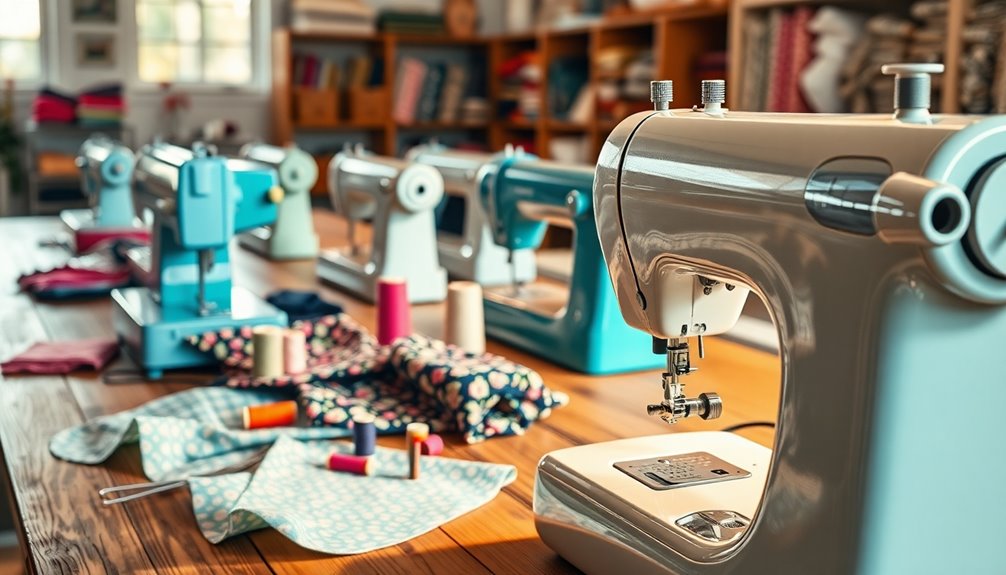
When I choose a sewing machine for my DIY projects, I always consider a few key factors. Stitch variety and ease of use can really make a difference, especially when tackling different fabrics. Plus, portability and power supply options are essential if I want to sew on the go.
Stitch Variety and Options
How can the variety of stitches in a sewing machine elevate your DIY projects? A machine with a wide range of built-in stitches, like essential, stretch, and decorative options, really boosts your creativity. I love how automatic buttonhole functions simplify making consistent, professional-quality buttonholes, which is essential for garment making. Plus, with features like mirror imaging and stitch elongation, I can explore custom designs that truly stand out. Machines boasting impressive stitch applications—like 1,172 options—offer the versatility needed for different techniques. And let's not forget about lettering fonts; they let me add personal touches like custom text or monograms, making my creations even more unique. Trust me, having stitch variety opens up endless possibilities!
Ease of Use
While diving into the world of DIY projects, choosing a sewing machine that's easy to use can make all the difference in your experience. I recommend looking for machines with user-friendly features like automatic needle threaders and clear threading guides, which simplify setup for beginners. Opt for models with minimal buttons or one-button operation to reduce the learning curve. Built-in stitch patterns and adjustable speed settings offer flexibility, allowing you to adapt to various projects. Extensive instructional materials, such as manuals or video tutorials, can help you learn and troubleshoot effectively. Finally, consider the machine's weight; lighter models are more convenient for quick repairs and on-the-go projects. These factors make your sewing journey smoother and more enjoyable.
Portability and Size
Choosing the right sewing machine for your DIY projects hinges on portability and size, especially if you're frequently moving between different workspaces. I've found that a lightweight machine, typically weighing around 2 to 5 pounds, makes it so much easier to carry and set up for quick tasks. A compact size also simplifies storage, perfect for those of us with limited space or who travel often. When searching, I recommend looking for features like battery operation or dual power options; they really enhance usability in various settings, even outdoors. A portable sewing machine can streamline your workflow for small projects, allowing for quick repairs and creative tasks without the hassle of bulky equipment.
Fabric Compatibility
Fabric compatibility is vital when it comes to selecting the right sewing machine for your DIY projects. I always make sure my machine can handle a variety of fabric types, from lightweight silks to heavier denims and leathers. It's important to check the maximum fabric thickness compatibility; some machines only sew fabrics up to 1.5 mm thick, while others can manage multiple layers without issue. I also look for versatile stitch options, including built-in decorative and stretch stitches, to enhance my creativity. Machines with adjustable presser foot pressure are a must, as they prevent puckering on lightweight fabrics. Finally, a reverse stitch option is invaluable for securing stitches across different fabric types, making my DIY projects more durable.
Power Supply Options
When I think about enhancing my DIY projects, power supply options come to mind as a key factor in selecting a sewing machine. Many machines offer dual power supply options, letting me choose between an AC adapter or batteries. This flexibility is perfect for home use and travel. I find battery-powered machines, which typically run on 4 AA batteries, super convenient for quick repairs on the go, though they do have limited stitching time compared to plug-in models. Some machines even feature a simple switch to toggle between power sources, making my life easier. Just remember, never use both at once to avoid damaging the motor. Choosing the right power supply helps me match my sewing habits effectively.
Included Accessories and Support
A well-equipped sewing machine can make all the difference in your DIY projects. When I choose a sewing machine, I always consider the included accessories, like various presser feet, needles, and bobbins. These enhance versatility and ease of use. I also appreciate machines that come with instructional DVDs or user manuals, as they help me get started without frustration. Additional tools like seam rippers and measuring tapes can be essential for finishing projects smoothly. Moreover, I look for machines with robust customer support, including online tutorials and technical assistance, which really helps when I face challenges. A thorough accessory kit guarantees I have everything I need, so I can dive right into my sewing adventures without extra purchases.
Frequently Asked Questions
What Types of Fabrics Can I Use With These Sewing Machines?
When I'm choosing fabrics for my sewing projects, I've found that most machines handle a variety of materials well. I typically use cotton for beginners, as it's easy to work with. For a bit of stretch, I love using jersey or knit fabrics. If I'm feeling adventurous, I'll try out denim or canvas for sturdier projects. Just remember to adjust the needle and settings according to the fabric type for the best results!
How Can I Maintain My Sewing Machine for Longevity?
To maintain my sewing machine for longevity, I make it a habit to clean it regularly. I remove dust and lint from the bobbin area and feed dogs. I also oil moving parts as recommended in the manual. Changing the needle frequently helps me avoid damage, too. I keep it covered when not in use to prevent dust build-up, and I always store it in a safe, dry place. These steps really help!
Are There Sewing Machines Suitable for Left-Handed Users?
Sewing machines for left-handed users are like finding a needle in a haystack, but they do exist! I've discovered that many machines are designed with ambidextrous features, making them perfect for us lefties. Look for models with adjustable presser feet and a top-loading bobbin for easier access. Brands like Brother and Janome often cater to our needs. So, don't let being left-handed hold you back; there's a perfect machine waiting for you!
What Is the Average Lifespan of a Sewing Machine?
The average lifespan of a sewing machine really depends on how often I use it and how well I maintain it. Generally, I've found that a good-quality machine can last anywhere from 10 to 25 years. If I take care of it—regular cleaning, oiling, and avoiding heavy fabrics—I can extend its life even longer. It's all about treating the machine with care and using it within its designed limits.
Can I Use My Sewing Machine for Embroidery Projects?
I remember the first time I thought about adding a little flair to my sewing projects. Can you use your sewing machine for embroidery? Absolutely! While most basic machines can handle simple embroidery, you'll find that some are better suited for intricate designs. If you're looking to release your creativity, consider investing in an embroidery machine. It'll open up a world of possibilities, turning your fabric into stunning works of art.
Conclusion
In summary, choosing the right sewing machine can make all the difference in your DIY projects. Whether you're a beginner or a seasoned crafter, there's a perfect machine out there waiting for you. It's time to roll up your sleeves and jump right in! With the right tools at your side, you'll be stitching up a storm in no time. So, don't hesitate—pick one that suits your needs, and let your creativity shine!
